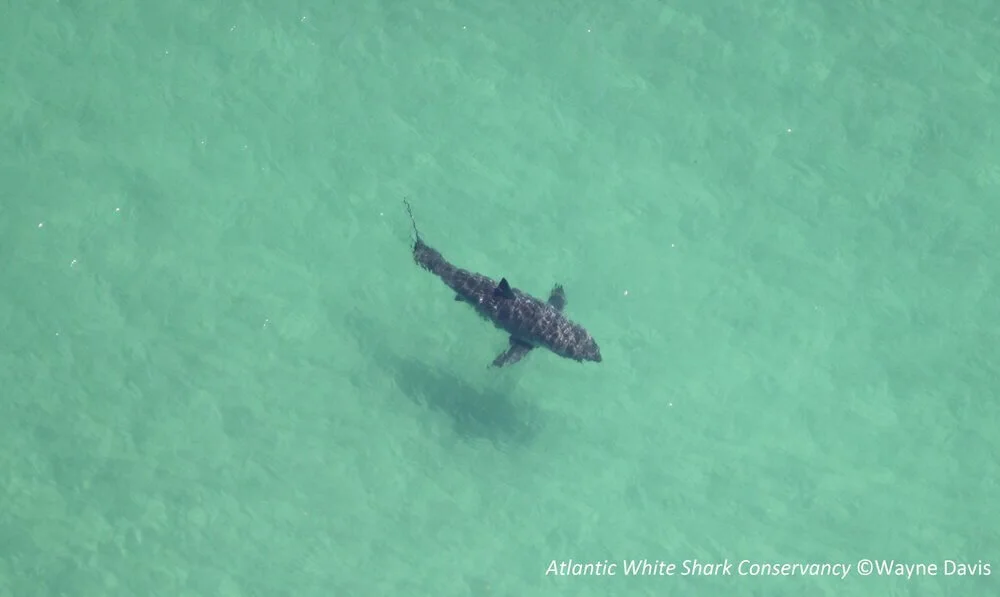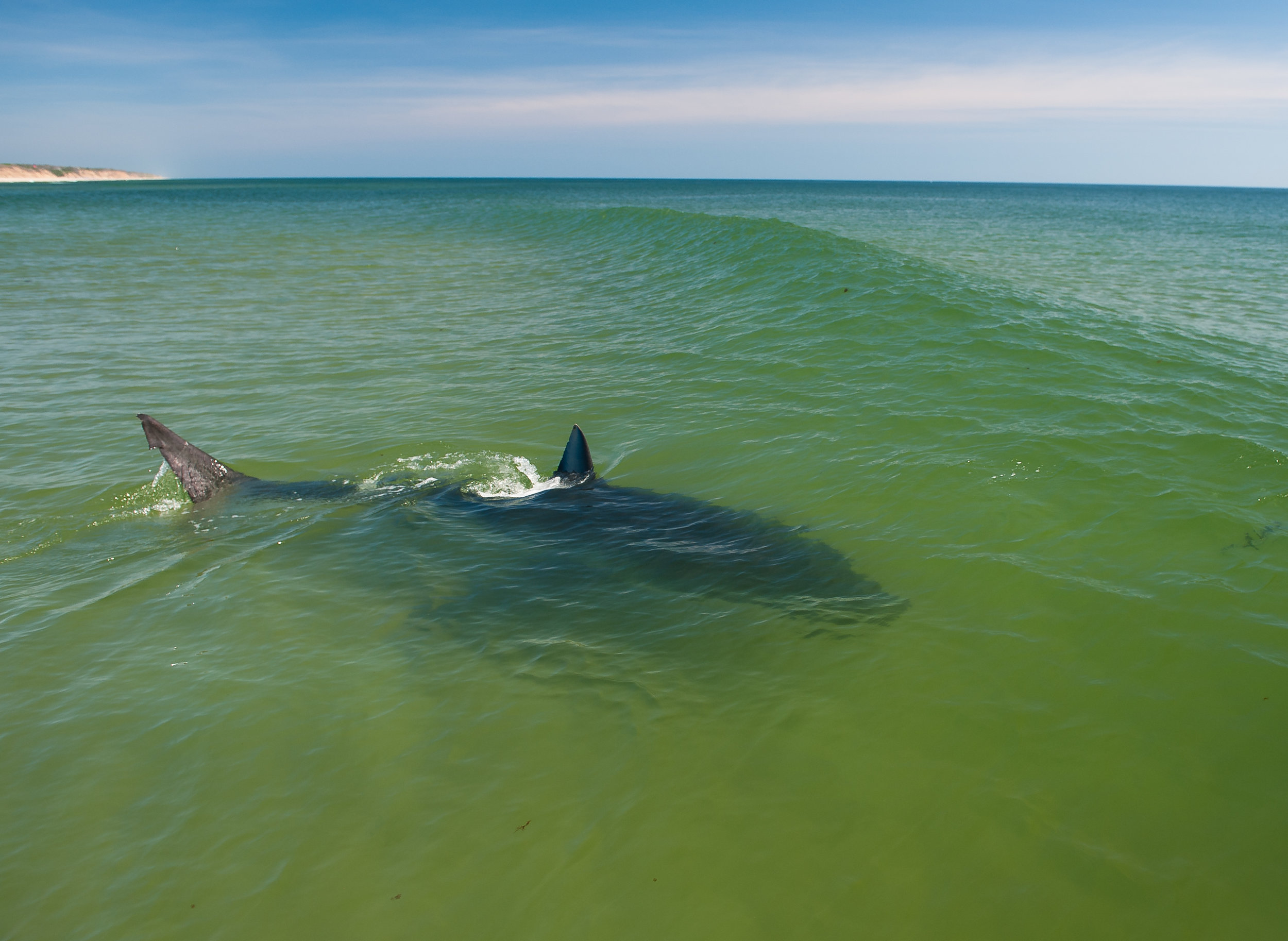Frequently Asked Questions
Do you have more questions? We have answers. Click below to find out answers to our most frequently asked questions, or contact us below.
Image by Pam King
White Sharks off Cape Cod
Has there been a rise in the number of white sharks off Cape Cod? +
Yes. Over the past decade, Cape Cod has emerged as the only known place in the northwest Atlantic where white sharks aggregate. Many modern-day residents and visitors of Cape Cod believe that recent increases in the regional abundance of white sharks is a new development. However, though records of white sharks are relatively sparse, archeological evidence, available catch data and anecdotal accounts suggest the 400-million-year-old species has a long history in the region.
What is driving the surge in sharks?
+
The abundance of white sharks in the area has increased over the past decade primarily in response to the local population recovery of gray seals, a favored food source for white sharks. Gray seals have recolonized the region following the prohibition of bounty hunting by the state of Massachusetts in the 1960s and the passage of the Marine Mammal Protection Act in 1972.
What is the role of sharks in the marine environment? +
White sharks are apex predators and as such are a critical species in the maintenance of a healthy and balanced marine environment.
How many white sharks are in the waters along the coast of Cape Cod? +
Over the past five years, the Massachusetts Division of Marine Fisheries, working in collaboration with the School for Marine Science and Technology at the University of Massachusetts Dartmouth and with the support of the Atlantic White Shark Conservancy, has been conducting a study to determine the size of the white shark population and identify trends. The study involves taking underwater videos of the sharks, identifying them based on their unique characteristics (spot patterns, scars, injuries), and tracking the number of previously-identified sharks relative to the number of ‘new’ sharks over time. To date, around 300 white sharks have been identified. However, the research team is still processing and analyzing the data, so there is no official population estimate yet.
Are the sharks changing their behavior hunting closer to shore or becoming more aggressive? +
There is no evidence of that. Hunting for seals in shallow water close to shore hasn’t changed since white sharks started predictably showing up to feed on seals in the summer and the fall.
Do sharks only eat seals? +
No. White sharks are opportunistic predators. While seals are a particularly good meal and one of the favorite foods of an adult white shark, sharks also eat fish, squid, and other sharks. What a shark eats is also related to its size. The teeth of white sharks change as they get older. When they are young and under 10 feet, white shark teeth are pointed and less serrated, which is better for grasping slippery prey items such as fish and squid. When they grow to be over 10 feet and broaden out, their teeth become more serrated, which better equips them for eating seals.
Image by Cody DeGroff
Human Encounters with Atlantic White Sharks
Do white sharks prey on people? +
White sharks aren’t out to get you. People are not on a shark’s menu. If they were, the number of encounters between sharks and people would be much higher. When bites do occur, our research indicates it was likely triggered for one of three reasons:
- Mistaken identity. Sharks can misperceive a person as a marine mammal.
- Curiosity. Sharks use their teeth much like a dog uses its nose, looking to gather information about what comes across their path.
- Defensive reaction. It may seem counterintuitive but, while sharks often evoke a sense of fear in people, they are capable of being afraid, especially if they are startled by a person.
Are shark attacks on people common? +
No. People being attacked by sharks is rare. Before the fatal encounter between a white shark and a surfer in Wellfleet in the fall of 2018, the last person fatally attacked by a shark in Massachusetts was recorded in 1936. Drowning is a far more dangerous threat to public safety than a shark attack. However, while the relative risk of a shark attack posed to people is low, the potential for interactions between white sharks and people is elevated in areas where sharks gather to feed on seals, particularly in regions with high numbers of recreational water users (swimmers, surfers, body boarders, stand-up paddle-boarders, scuba divers, and kayakers).
Are there times of the year that are particularly risky for shark encounters? +
Based on the tagging data collected to date, we know that peak white shark activity along the coast of Cape Cod occurs from the summer through the fall. In this region, white sharks hunt for seals in nearshore waters, which is why we advise recreational water users to avoid areas where seals are present.
The Massachusetts Division of Marine Fisheries has been tagging white sharks off the coast of Cape Cod for almost a decade now and is analyzing that data in more detail to identify other trends as it relates to how, or if, times of day, tidal conditions, and local topography affect shark behavior.
Are the sharks mostly congregating along the outer Cape? +
Certainly, the outer Cape is where we’ve had the most sightings. However, that’s also where researchers have concentrated their field studies. Other parts of the Cape still need to be surveyed to get a better idea of the presence of sharks in those areas. We do know that white sharks are large, mobile animals that are not naturally confined to one area. Based on tagging data that’s been collected we also know that sharks move frequently between the outer Cape and other regions (Cape Cod Bay, Gulf of Maine, Canada, New York Bight).
Are there any areas where there are no sharks? +
The waters surrounding Cape Cod are part of a wild ocean environment with a diversity of marine life, which includes many species of sharks – from sand tigers and threshers to basking and white sharks. Sharks are mobile animals that are not confined to any one area. Fresh water ponds or pools are the only place where you can swim on Cape Cod where you won’t find sharks of any kind.
White Shark Public Safety
Where is it safe to swim? +
The ocean is a dynamic environment and beachgoers always need to be cautious when entering the water. The Atlantic White Shark Conservancy is committed to sharing information about white shark movements and behaviors with the public so that people decide for themselves how and where they use the water recreationally.
What is being done to enhance public safety? +
Various towns on the outer Cape and the Cape Cod National Seashore are leading the effort to better protect residents and tourists who visit our beaches. As the 2019 summer season approaches, new signage and better communication equipment are being installed. Town beach managers and the Cape Cod National Seashore are also increasing the number of lifeguards patrolling area beaches, extending the lifeguard season, and deploying more ATV’s and shark bite first aid equipment.
However, it’s important to note that, as is the case in other parts of the world where there are shark-human encounters, there is no single-source solution that ensures 100% guaranteed safety. In the event someone is bitten by a shark, first response will be critical. To assist in those efforts, the Atlantic White Shark Conservancy has partnered with local first-responders to offer “Stop The Bleed” training. To learn more about that initiative click here https://www.bleedingcontrol.org/
What technologies and/or deterrence techniques are being explored? +
The Towns of Chatham, Orleans, Eastham, Wellfeet, Truro, and Provincetown, along with the Cape Cod National Seashore and the Atlantic White Shark Conservancy, have hired independent researchers, The Woods Hole Group, to analyze a broad range of mitigation strategies that have been proposed by the local community, such as the use of drones, shark detection buoys, netting and barriers. Local officials are working diligently to heed the urgent call from residents and visitors to deploy technology and techniques to reduce the chances of shark encounters with people in the water. It is also important to understand which technologies/techniques may or may not work, as marine environments are complex and vary in multiple ways depending on the geographic location. What may be effective in South Africa or Australia may or may not be effective along the coast of Cape Cod.
The Woods Hole Group is expected to complete their study by the early fall, the results of which we will share with the public.
About the Atlantic White Shark Conservancy (AWSC)
How can I see white sharks? +
White sharks are an amazing species! We offer safe and exciting excursions, expeditions and even cage diving to witness these fascinating apex predators in their natural habitat. To learn more about these opportunities or to book a reservation, please click on https://www.atlanticwhiteshark.org/white-shark-expeditions
What is the AWSC Shark Center? +
The AWSC Shark Center is our home where visitors can get an in-depth look at one of the ocean's most magnificent and misunderstood species: the Great White Shark. At our Shark Center, which is open to the public seasonally, we have interactive exhibits, videos, displays, virtual reality experiences, and many other ways to learn about our one of Cape Cod's most captivating summer residents. For more information about the Shark Center, hours of operation, or directions please visit our Shark Center page at https://www.atlanticwhiteshark.org/shark-center
Are there volunteer opportunities with the Atlantic White Shark Conservancy? +
Yes! As a non-profit organization, we rely heavily on volunteers. Please visit our volunteer page to learn how you can join our team at https://www.atlanticwhiteshark.org/volunteer
Do you have an internship program? +
For college students and recent college graduates, we offer unpaid internships for various positions based on project needs for the season. Positions are posted on January 3rd. The application period runs from the beginning of January until the end of the first week of February. To learn more about our internship program and how to apply please visit http://www.atlanticwhiteshark.org/internship-opportunities
Are you hiring? +
If you are interested in employment with us, please check our employment page regularly for current job opportunities at https://www.atlanticwhiteshark.org/employment
Do you accept donations? +
As a non-profit, donations are the lifeblood of the Atlantic White Shark Conservancy. Donations directly fund our white shark research, public safety programs, outreach and education initiatives, as well as program expenses such as our outreach efforts, our research spotter pilot, underwater footage and our Gills Club newsletter. Among the more popular ways to donate is through our buoy, name-a-tagged-shark, or Sharktivity App sponsorships. To find out more about ways you can donate please visit our donor portal at http://www.atlanticwhiteshark.org/donate
How do I book an Atlantic White Shark Conservancy representative for a lecture? +
Our staff frequently speaks at forums and lectures at events. If you would like one of our representatives to speak at your event, please contact info@atlanticwhiteshark.org. We will travel just about anywhere in the New England area.
Do you have youth programs? +
We offer “Shark Week for Kids” summer programs for youths ages 5- to 12-years-old. The camps vary by location. Please see our Kids Summer Program page for more information visit: https://www.atlanticwhiteshark.org/shark-summer-program.
Also, to encourage more young girls to consider science, technology, engineering and math (STEM) careers -- we also have the Gills Club. The Gills Club is for girls 13 and younger where members receive monthly newsletters centered around shark science and hands-on learning opportunities at monthly events. To get your child involved in the Gills Club please, click here to register http://www.gillsclub.org/events .
To sign up for Gills Club events, click here http://www.gillsclub.org/events.
We are always looking for female scientists to help with the Gills Club. If you are a female scientist and would like to get involved please contact us at gillsclub@atlanticwhiteshark.org
Do you share your research on sharks? +
Our primary mission is white shark research and education – all of which we freely share. We are currently working on several white shark research projects in collaboration with regional partners, including the Massachusetts Division of Marine Fisheries, the School for Marine Science and Technology at the University of Massachusetts Dartmouth, the Anderson Cabot Center at the New England Aquarium, and the University of New England. To learn more about past and ongoing research, please visit https://www.atlanticwhiteshark.org/white-shark-research
If you are an educator looking for a data set to be used for as part of your curriculum, please visit the education resources page for mock data, lesson plans, and other resources at https://www.atlanticwhiteshark.org/education-resources
How do I get a white shark license plate? +
Our white shark license plates are only available for vehicles registered in the state of Massachusetts. The special plate fee is $40 -- $28 of which tax deductible and donated to the Atlantic White Shark Conservancy. When you renew your plate after 2 years, the full $40 is donated. You can order your plate online through the Registry of Motor Vehicles at https://www.atlanticwhiteshark.org/white-shark-license-plates
Do you sell merchandise? +
We offer a variety of shark-themed merchandise – from necklaces, cufflinks and hats to pullovers, nail polish and sunglasses. All proceeds from merchandise sales help fund our research and education initiatives. To see our inventory or to place an online order, please visit our online shop at http://www.atlanticwhiteshark.org/shop
We also partner with businesses to sell merchandise at our Shark Center Chatham or Shark Center Provincetown. If you are interested in becoming a merchandise partner, please contact Emma at emma@atlanticwhiteshark.org
Media/Interview Requests +
All press inquiries and/or interview requests can be submitted to Atlantic White Shark Conservancy CEO Cynthia Wigren by emailing info@atlanticwhiteshark.org





